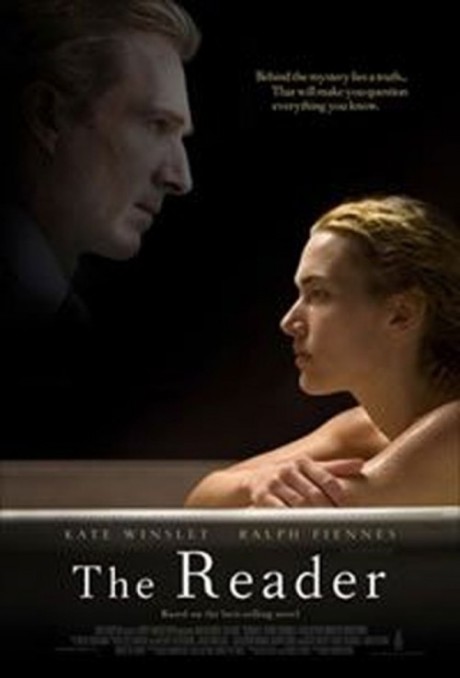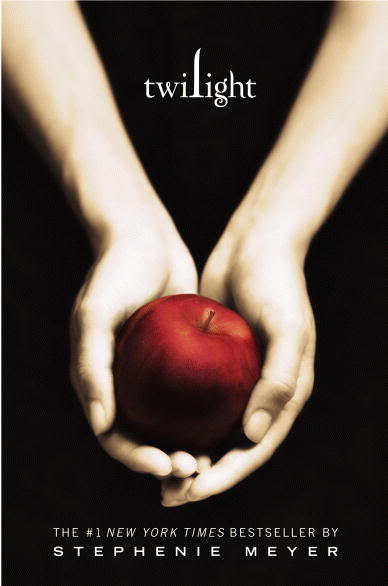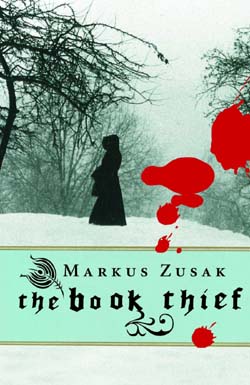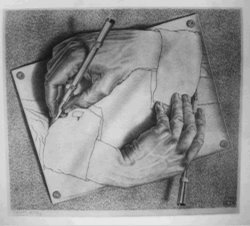Is it ever too early to start re-writing? July 26, 2011
Posted by pacejmiller in Fantasy, Misc, Novel, On Writing, Study.Tags: Anne Lamott, Bird by Bird: Some Instructions on Writing and Life, Book Thief, Markus Zusak, Philip Pullman, rewriting, stephen king, writer resources, Writing
2 comments
I’m trying to put my focus back into writing starting this week, and one aspect of that is to revisit my dormant fantasy novel which I have been thinking about a lot these past couple of months. I still think the book as potential and I like the story it has to tell, but having written significant chunks of it around 2 years ago, I know it will require plenty of work.
Conventional writing wisdom suggests that rewriting comes after completion of the first draft. The primary goal in the first attempt is to just get the words of the story out of your mind, out of your system and onto the page. Anne Lamott, who wrote the popular writing book Bird by Bird, discussed at length the unavoidable ‘shitty first drafts’ even excellent and seasoned writers churn out on a regular basis.
The idea is that if you worry and procrastinate over every paragraph, sentence or word, you’ll never generate any momentum and it will take you much longer to finish the story. And often it’s when you are in that ‘zone’ of pumping out a copious amount of words at a frenetic pace that some of your best writing is generated (though it has to be ‘unearthed’ from all the crappy stuff).
However, although I am not even at the halfway line of the first draft of my fantasy epic (around 150,000 words), I’m highly tempted at the moment to go back to the beginning and rewrite a few of the first chapters. One of the main reasons is that I realised my beginning lacked a serious punch. After an action-packed prologue, I started with the usual boring ‘fantasy world introduction’ chapter where I introduced the characters and the world in which they lived in a methodical fashion. It occurred to me that it would have made a lot more sense to start in the middle of the action, beginning with the final of a tournament in which the protagonist is involved in. In the current version, the tournament was already over by the time the story began.
But would rewriting before I’ve even finished the first draft be a waste of time? What if I later change my mind and come up with a better intro? What if later on I decide to change characters or events?
I read in an interview with Philip Pullman (author of the His Dark Materials trilogy) that he doesn’t have a particular method when it comes to writing and rewriting. Sometimes he waits until the end and sometimes he does it as he goes along.
In Stephen King’s brilliant On Writing (my review and summary here), he says that first drafts should be completed within 3 months, which is pretty much supernatural for most people out there, but even for him, this essentially means no rewriting until the first draft has been completed. King also recommended putting the draft aside for a while before coming back to it with fresh eyes. That said, King might be an anomaly because he seems to churn out pretty decent first drafts. I say this because he suggests that a second draft should tighten a first draft by 10% and that he usually only does two drafts and a polish for a novel.
Markus Zusak, author of The Book Thief, said in an interview that he did literally 150-200 drafts of the first 90 pages just to get it right. Can you imagine that? I did about 5 or 6 drafts of the first chapter of my Masters writing project and I found it to be brutal already.
In the end, my gut tells me that I should just do whatever I feel like, whether it’s keep going or go back to the beginning. It’s been so long that anything is better than nothing.
Full UK Review, Part IV: Books July 21, 2009
Posted by pacejmiller in Book Reviews.Tags: Bernhard Schlink, books, Genesis of Shannara, God Actually, His Dark Materials, Ice Station, Joe Hill, John Grisham, Kate Winslet, Markus Zusak, matthew reilly, non-fiction, novels, On Writing, Philip Pullman, Revolutionary Road, Richard Yates, Roy Williams, stephen king, Stephenie Meyer, Terry Brooks, The Associate, The Book Thief, The Gypsy Morph, The Heart Shaped Box, The Subtle Knife, Twilight
add a comment
During my 9 months in the UK I also read 9 novels, 1 non-fiction book and listened to another (audio book)
I probably should have read more, but when you’re already reading hundreds and hundreds of pages in textbooks and articles and cases every week, you’ll tend to cut yourself some slack.
Adhering to the advice of Stephen King, I tried to read as widely as possible, good books and bad. I’m not good enough of a writer or reader to be picky or critical about other authors, so I read whatever is out there that catches my attention or is recommended by others.
Here are the novels I read in rough chronological order (and rating in parenthesis):

The conclusion to the Genesis of Shannara was a little disappointing
The Gypsy Morph (Terry Brooks) – the third and final book in his prelude to the Shannara series was a slight disappointment. I started reading Brooks after randomly picking up the first book of the series, Armageddon’s Children, in a bookstore. If I wanted to write fantasy I should read the works of a ‘master’ (as the cover stipulated), I decided. The first book hooked me with its premise of a post-apocalyptic world that weaved fantasy into it, but the latter two didn’t live up to expectations. The ending was literally too fantastic for me. That said, one of the next books on my list is his original The Sword of Shannara. (2.5 out of 5).
The Heart Shaped Box (Joe Hill) – this much-hyped novel by the son of Stephen King was not the spectacular horror thrill-ride that I had anticipated, but it wasn’t bad either. It’s about an ageing rock star who purchases the suit of a dead man online. The story was a lot more personal and confined than I expected, but Hill does show flashes of his old man in his writing. (3 out of 5).
The Subtle Knife (Philip Pullman) – after reading The Northern Lights (or The Golden Compass), I opened The Subtle Knife with great eagerness. But I was ultimately disappointed by it, and I don’t know if I will ever read the final book, The Amber Spyglass. For some reason the second book just never gripped me like I wanted it to, as well written as it was. (2.5 out of 5).

The Kate Winslet/Ralph Fiennes version of The Reader
The Reader (Bernhard Schlink) – I read the book after hearing about (but not having seen) the movie. Translated from German, this short novel posed some interesting questions about the Holocaust that got me reading more about it elsewhere. I suppose that is the sign of a good book. It’s a good lesson in writing with brevity, which I still struggle with (as evident from this post). (4 out of 5).
Ice Station (Matthew Reilly) – yes, laugh it up – I read Matthew Reilly. This is the second Reilly book I’ve read, the first being its sequel, Scarecrow. Reilly is one of those guys that critics hate because he doesn’t write ‘well’ in the conventional sense. Frankly, he also seems like one of those guys that will froth at the mouth when they talk excitedly about some realistic action scene from Transformers 2. But I have a deep respect for how hard he works and I envy the confidence with which he writes. And no one can deny that he can write a blistering action scene, even if it’s laced with appalling dialogue. Oh, and I thought Scarecrow was better. (3 out of 5).

Twilight was...okay
Twilight (Stephenie Meyer) – the reading of this book was wedged around the release of the film (which I watched). I just had to see what the fuss was all about. And…I don’t get what the fuss is all about. Don’t get me wrong, I don’t think it’s bad, but just not worthy of a worldwide phenomenon. But then again, I’m not a teenage girl. That said, I thought the book was better than the film (though I don’t think I will read New Moon or any of the other ones). (3 out of 5).
The Associate (John Grisham) – my first Grisham fiction novel was a shocker (full review here). It was like Seinfeld (ie about nothing) except without the awesome jokes. Or perhaps the joke was on his readers. Grisham fans tell me that this was an anomaly and that his earlier stuff is actually really good, so I’ll give him another try some day. To me, he is still a hero of sorts that I aspire to, being a lawyer-turned-writer and all. (2 out of 5).
Revolutionary Road (Richard Yates) – a few pages into Revolutionary Road, I realized I was reading something special (full review here). I watched the movie first, but that didn’t lessen the enjoyment of this novel. Outer and inner dialogue, description, pacing, irony – it’s just unfair how much talent some writers have. (5 out of 5 stars).

Well written...Markus Zusak's The Book Thief
The Book Thief (Markus Zuzak) – a book that I almost wish I liked more (full review here). It’s written with exquisite elegance and descriptions that make me envious, but the story itself didn’t fully captivate me all the way through. It’s like a soup that is kept on low heat, and it’s not until the very end that you realize that all that simmering was so the final boil would be more rewarding. (3.5 out of 5).
I also read one non-fiction book, a gift from a friend called God Actually by Roy Williams. Williams is a former lawyer and another one of those former skeptics that found religion later on in life. I’ve been working on a full review of it for some time, so I’ll skip it here.
Lastly, I listened to the audio book version of Stephen King’s On Writing (full review here). It’s probably the most important book I’ve read (or listened to) during my stay in the UK. A terrific book for aspiring writers.
Book Review: The Book Thief April 23, 2009
Posted by pacejmiller in Book Reviews, On Writing.Tags: Anne Frank, bestseller, book review, Death, Holocaust, Liesel Meminger, Markus Zusak, Novel, The Book Thief, Writing
5 comments

The Book Thief by Markus Zusak
Recently I’ve been envious of a lot of other writers (pretty much after every book I read). It may be the way they can create vivid images in my mind with apparent ease, or the way they can use dialogue to make their characters come alive effortlessly – or just their success. Well, add Markus Zusak, the award-winning Australian author of The Book Thief, to that list.
I bought The Book Thief almost a year ago, but it wasn’t until my recent European trip that I actually got around to reading it. Here’s what I thought of it.
What is it about?
I never like to give away too much plot, so all I will say is that The Book Thief centers around a young girl named Liesel Meminger (who, of course, is the Book Thief), and the story takes place during World War II in Nazi Germany. Sounds pretty familiar right? But don’t be tricked by the premise. The Diary of Anne Frank it is not. The Book Thief is, without a doubt, one of the most unusual books I have ever read.
What makes it unusual?
For starters, the storyteller of the novel is Death. Yes, that’s right, Death. A rather apt choice considering that the story takes place during the Holocaust. However, despite the grim topic and the grimmer narrator, Zusak manages to convey the story in a (for the most part) lighthearted manner that is brimming with its young protagonist’s curiosity and mischief. Perhaps it takes away some of that realism and genuine horror, but having the story told by a character supposedly detached from humanity was eerily effective. Further, the story is told largely from the point of view of the Germans. In fact, there’s only one main Jewish character in the whole book.
The Book Thief is also a love affair with books – and a examination of the power of words and stories. Indeed, Zusak alludes to the view that Hitler was able to become who he was because he was a master of words – a master at using words to manipulate people. He didn’t need to be big and strong or wealthy, and he didn’t need a gun. He became the most powerful man in the world because he understood the power of words.
So, how was it?
To be honest, it took a while for me to get into The Book Thief. Not because it was boring (though it was slow in certain parts), but because of the book’s unusual style. The narrative jumps around a bit, and there’s the occasional poetic extract in bold from the narrator that breaks things up. Each section of the book also has a tiny summary at the front, comprised primarily of single words, short phrases and things that don’t make much sense until you finish the section. It was highly unusual.
Furthermore, despite the scope of the events surrounding the characters, The Book Thief is a very personal story. It is essentially focused on a single town, a single street (which happens to be the street on which the protagonist lives) and on a small handful of characters.
Even when I finally got used to it, for a while I wondered where the story was going and what it was getting at. Dare I say I even found it difficult to read on, despite the fact that the book was clearly fabulously written.
But I’m glad I did, because gradually, I realized that it wasn’t all just aimless wandering. Before long, I realized that I actually cared about the characters. I realized that I was sympathizing with Germans in the Holocaust. Though their suffering paled in comparison to the Jews, that does not mean they were not victims too.
By the end of the book, I was deeply moved. At some point (and I don’t know exactly where, except that it was quite late), The Book Thief stops being just an exceptionally written novel – it simply becomes exceptional. It’s one of those books with the ability to linger in your mind long after the final page.
Overall, I’d say it was a good book that unfortunately didn’t become great until it neared the end. Perhaps a little too long and a little tedious at times, but there was no doubting how well it was written. And it does pack an emotional punch at the end. 3.5 out of 5 stars!
Zuzak’s writing style
While the novel has its problems it does not mean the author is not worthy of praise. I grew increasingly envious of Markus Zusak’s writing ability as the book progressed. In particular, Zusak has a knack for descriptions (which I consider one of my weakest points as a writer). In The Book Thief, some of his descriptions are so out of the ordinary and so brilliant that it made me shake my head. Especially those relating to character traits. For instance, Liesel’s foster mother is repeated referred to as a ‘cardboard woman’; her foster father has ‘silver eyes’ and her best friend has ‘yellow hair’. These may seem unremarkable but whenever I saw these references in the book I would instantly recognize the character. These images are so ingrained in my memory that I can still immediately come up with them off the top of my head despite having finish the book weeks ago. Some may be unimpressed with his overuse of metaphors (like ‘the sky was the colour of Jews’) or even find his style pretentious, but as an aspiring writer trying to learn the craft, I was intrigued by his confident use of unusual descriptions and imagery.
I also found Zusak to be a great craftsman who is able to shape a story with control and subtlety – he doesn’t rub anything in your face. He builds it up, gives you the chance to learn the characters. At the same time he gives you room to think about and interpret the imagery (and there is a lot of that, especially in the short stories and hand-drawn artwork in the book). Even if you don’t enjoy the book, it doesn’t hurt reading it just to see and learn from the way Zusak writes (regardless of whether you like his style or not).
It doesn’t appear that Zusak was naturally gifted with these skills. I just read a fascinating interview with the author entitled ‘Why I write’ in which he describes his struggles with writing (see here). It also has some terrific insights into the craft and process of writing which I found very useful. Another great article on his personal journey in creating The Book Thief can be found here. Just shows it’s not easy coming up with an international bestseller.
Maybe there’s still hope for me.

 Following my book review of The Book Thief by Australian author Markus Zusak, I decided to look a little deeper into the life of this wonderful writer. And so I came across a series of videos from Sutherland Shire Library in Australia, where Markus Zusak (who grew up in Sutherland) discusses his childhood experiences and how he came to write The Book Thief.
Following my book review of The Book Thief by Australian author Markus Zusak, I decided to look a little deeper into the life of this wonderful writer. And so I came across a series of videos from Sutherland Shire Library in Australia, where Markus Zusak (who grew up in Sutherland) discusses his childhood experiences and how he came to write The Book Thief.



 Stumble It!
Stumble It!

